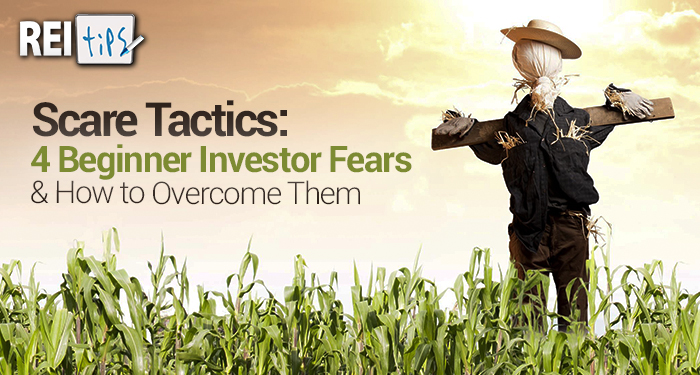You worry, “What if I don’t know what I’m doing? What if other people are better than me? What if I get laughed at?”
Well, okay, maybe that last one is a little different for adults. But still, the fear of failure can be just as intimidating for adults as it is for children. In many ways, we have a lot more at stake.
When working with beginner investors, I hear some of the same concerns – over and over again.
So today, I’m addressing those fears. Plus, I want to share my insight for overcoming and moving past those obstacles.
After all, none of us are perfect. Even experienced investors struggle with daily doubts. But once you learn more about how to appropriately handle these fears, that’s when you’ll truly be able to succeed as a real estate investor.
So, let’s dive right into it…
Fear #1: Financial Woes
“Rule No. 1: Never lose money. Rule No. 2: Never forget rule No. 1”
~Warren Buffet
Whether it’s the fear of losing money, not making enough money or just money management in general – real estate investing can bring a lot of financial anxiety into your world, if you let it.
If you didn’t grow up being exposed to real estate investing (and, let’s face it – most of us didn’t), learning about the financial aspect of this profession can be daunting.
Your financial fears may include:
 Miscalculations: When determining your rehab budget or maximum allowable offer (MAO) for a property, it can be scary not knowing if your numbers are on target.
Miscalculations: When determining your rehab budget or maximum allowable offer (MAO) for a property, it can be scary not knowing if your numbers are on target. Negotiating: As a new investor, especially, negotiating with a seller can be (*gulp*) a bit intimidating. There’s always the fear that they will be more informed, more confident and more unyielding.
Negotiating: As a new investor, especially, negotiating with a seller can be (*gulp*) a bit intimidating. There’s always the fear that they will be more informed, more confident and more unyielding. Losing $$$ big time: Beginner investors often have very little capital to begin with – and the fear of losing that money, due to your inexperience, can be very overwhelming. How do you know if you’ve chosen the right property? How do you decide how much money to put into it? What if it’s a total flop and you lose everything? The list could go on and on.
Losing $$$ big time: Beginner investors often have very little capital to begin with – and the fear of losing that money, due to your inexperience, can be very overwhelming. How do you know if you’ve chosen the right property? How do you decide how much money to put into it? What if it’s a total flop and you lose everything? The list could go on and on.
Right about now, you’re probably thinking, “Well, great. This is just making me feel worse.” But my goal isn’t to scare you more – it’s to point out the fact that your fears are NORMAL. Your fears are not unfounded.
In fact, if you don’t have some sense of fear when it comes to real estate investing, that’s probably cause for concern.
So, let’s continue outlining some of the fears you may be feeling, and then – you’ll turn this thing around and help you feel positive and excited about your future as an investor.
Fear #2: Finding the Right Deals in the Right Markets
This fear is a 2-parter. As an investor, finding property deals is a HUGE contributing factor to your success. At the same time, you can find the best property ever – and if it’s in the middle of the worst market ever – you probably won’t succeed.
When you find the right property in the right market, however, that’s when the magic happens.
So, let’s break down some of the finer details of this fear:
 Property type: Do you want to invest in single-family homes, multi-unit properties or a combo of both? Not knowing which way to go can cause a lot of anxiety for new investors.
Property type: Do you want to invest in single-family homes, multi-unit properties or a combo of both? Not knowing which way to go can cause a lot of anxiety for new investors. Building a pipeline: Even after you determine which property type(s) you want to pursue, it can be challenging to keep a sufficient pipeline of upcoming deals. But this is an essential part of ensuring that your REI business is sustainable.
Building a pipeline: Even after you determine which property type(s) you want to pursue, it can be challenging to keep a sufficient pipeline of upcoming deals. But this is an essential part of ensuring that your REI business is sustainable. Understanding unfamiliar markets: Sometimes, the best markets are the ones you’re least familiar with. If you don’t understand the ins and outs of those markets, you probably won’t be successful there. Building your knowledge of the area is the key to confronting this fear.
Understanding unfamiliar markets: Sometimes, the best markets are the ones you’re least familiar with. If you don’t understand the ins and outs of those markets, you probably won’t be successful there. Building your knowledge of the area is the key to confronting this fear.
 Demand – Is this market a place where homes are in high demand? Is population flowing into this community or out of it?
Demand – Is this market a place where homes are in high demand? Is population flowing into this community or out of it? Target tenant/buyer – When considering a potential property deal, think about who your target buyer or tenant would be. For instance, if you want to invest in an apartment complex in a college town, is the building within easy walking distance of the college? If your target tenant is a middle-class family, does the property have amenities such as stores, parks and businesses nearby?
Target tenant/buyer – When considering a potential property deal, think about who your target buyer or tenant would be. For instance, if you want to invest in an apartment complex in a college town, is the building within easy walking distance of the college? If your target tenant is a middle-class family, does the property have amenities such as stores, parks and businesses nearby? Market history – Growth in recent years is very important, but also be sure to look at the market’s long-term history, as well as projections about where this market is headed. The “hottest” markets aren’t always necessarily the best choice. Sometimes, it’s the ones that are on the verge of “up and coming” that are the better fit.
Market history – Growth in recent years is very important, but also be sure to look at the market’s long-term history, as well as projections about where this market is headed. The “hottest” markets aren’t always necessarily the best choice. Sometimes, it’s the ones that are on the verge of “up and coming” that are the better fit.
But as you start to become more and more familiar with your target market, you will be able to almost instantly identify which properties are (or are not) good deals. The process will become virtually automatic for you.
So, take heart! Practice makes perfect.
Fear #3: Tenants
I could just leave it at that: tenants.
There’s nothing that strikes fear into the heart of a property owner quite like the nightmare of a bad tenant. Whether it’s a needy tenant (cue the “I need a lightbulb changed in the kitchen” phone call at 9 p.m. on a Tuesday) or a destructive tenant (why – just why – would you attempt to mount a TV on the wall without the proper equipment?)
What’s even worse: investors who put up with terrible tenants just to avoid the headache of looking for a replacement tenant. These types of investors are willing to tolerate a tenant’s bad behavior and don’t increase rent with the changing market – for fear of the tenant leaving.
One pearl of wisdom that I want to offer concerning tenants is: It’s not always financially feasible for beginner investors, but one of the best solutions you may find is to hire a property manager or a property management company.
You might be surprised to find how affordable this strategy can be. Plus, the time that you will save (by allowing the property manager to take care of minor tenant needs or complaints) can be entirely worth the investment. That’s valuable time that you can be using to scope out new property deals.
So, hiring an experienced and trustworthy property manager can be an ideal way to minimize your fear of tenants. This is especially essential if you plan to invest in markets that are located outside your community or outside your state.
Fear #4: The Unknown
“Fear of the unknown is the greatest fear of all.”
~Yvon Chouinard, founder of Patagonia
This one is pretty obvious. But anything that involves a significant amount of money, risk and the unknown is going to cause fear.
As a beginner investor, you may feel intimidated by experienced investors, and believe that you’ll never be able to have the level of knowledge and expertise that they possess. But you’d be wrong to think that…
None of us came out of the womb ready to invest in real estate. We have all had to build our knowledge from ground zero.
So, the key here is: Don’t let your fear of the unknown rule you. If you let this overpower your mindset, you will never achieve success in this industry.
Even the most prepared, organized and skilled investor in the world is going to have fears when it comes to doing a deal.
The difference between successful and unsuccessful investors is simply their attitude toward those fears.
When you’ve done your research on a potential deal, studied the market and secured the necessary finances, it’s time to take action. Don’t back down. You have to learn to trust yourself and your instincts.
Now that we’ve taken a look at some of the greatest fears for new investors, I want to give you a few more tips for overcoming these concerns, so you can really take charge of your business and achieve the success that you desire.
Conquering the Fear: As Easy as 1, 2, 3
As an investor, I’ve found that the ability to overcome your fears really comes down to 3 essential practices. If you embrace these, and work on them continuously, you can quickly eliminate the fear that may be holding you back.
1. Be smart about financial risk
1st: never invest with your emotions. Always rationalize every property deal before going through with it. Never give in to greed or fear, because that will just lead you down a bad path.
2nd: research EVERY cost associated with an investment. Consider the vacancy cost, maintenance budget, tenant risk, etc. Also think about how these will impact your cash flow. Prepare for the worst, and you will be ready if it happens.
3rd: always have a backup plan. Don’t place all of your finances into one deal, with the hope that it will work out. Have a safety net and contingencies already in place, so you can rest easy. All of us experience financial failures every once in a while. Just make sure you have the reserves in place to make sure it doesn’t destroy your business.
2. Create a solid support system
I recommend building an emotional support system that includes family and friends, but also other REI professionals. This will give you the resources you need to express your concerns and to receive helpful feedback.
No one is successful on their own. The wealthiest people in the world didn’t reach that point by themselves. If you really want to succeed, you need the emotional support.
“Don’t let anyone rent a space in your head, unless they’re a good tenant.”
~Anonymous
It’s also critical to surround yourself with fellow investors whose business models and work ethics you admire. Because you are who you hang out with. By spending time with successful investors, their habits and methods will eventually “rub off” on you.
Long story short: carefully choose the people who will emotionally, mentally and professionally impact your mindset.
3. Be a lifelong learner
Take some time to sit, think and write down the parts of your investing knowledge that you want to improve. Be honest about your shortcomings and areas where you lack expertise. This first step is HUGE for overcoming your fears, because it makes the unknown known.
From here, you can devise a plan of attack…
Join your local REIA, read newly released and popular real estate investing or entrepreneurial-focused books and attend industry-related trainings. Find an experienced REI mentor who is willing to simply give you advice, and make sure you study market history, trends and forecasts in your area.
There is so much to learn… you could spend all day discovering more. Obviously, you want to leave plenty of time for finding property deals and managing your current properties, but this component of self-education is essential to your investing success – so make sure you carve out enough time for it.
The Only Thing to Fear…
…is you.
You have the power to succumb to your fears or to overcome them. Everyone will experience small failures time and time again. But you cannot let these obstacles break your spirit. Learn from them, move on, fall forward.
No matter what you fear most, a positive mindset, a passion for learning, a strong support system and the ability to assess financial risk will go a long way in easing those fears.
Have confidence in yourself.
Every investor – even the most successful of us – started where you are. If you give it your best effort, you won’t be disappointed.
Taking Charge
What are your top concerns and fears, when it comes to real estate investing? Which strategies have you used to overcome those worries? Let me know in the comments section below.




